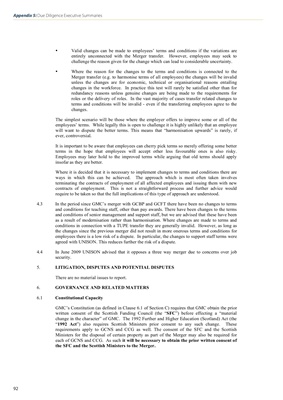
• Valid changes can be made to employees' terms and conditions if the variations are
entirely unconnected with the Merger transfer. However, employees may seek to
challenge the reason given for the change which can lead to considerable uncertainty.
• Where the reason for the changes to the terms and conditions is connected to the
Merger transfer (e.g. to harmonise terms of all employees) the changes will be invalid
unless the changes are for economic, technical or organisational reasons entailing
changes in the workforce. In practice this test will rarely be satisfied other than for
redundancy reasons unless genuine changes are being made to the requirements for
roles or the delivery of roles. In the vast majority of cases transfer related changes to
terms and conditions will be invalid - even if the transferring employees agree to the
changes.
The simplest scenario will be those where the employer offers to improve some or all of the
employees' terms. While legally this is open to challenge it is highly unlikely that an employee
will want to dispute the better terms. This means that "harmonisation upwards" is rarely, if
ever, controversial.
It is important to be aware that employees can cherry pick terms so merely offering some better
terms in the hope that employees will accept other less favourable ones is also risky.
Employees may later hold to the improved terms while arguing that old terms should apply
insofar as they are better.
Where it is decided that it is necessary to implement changes to terms and conditions there are
ways in which this can be achieved. The approach which is most often taken involves
terminating the contracts of employment of all affected employees and issuing them with new
contracts of employment. This is not a straightforward process and further advice would
require to be taken so that the full implications of this type of approach are understood.
4.3 In the period since GMC's merger with GCBP and GCFT there have been no changes to terms
and conditions for teaching staff, other than pay awards. There have been changes to the terms
and conditions of senior management and support staff, but we are advised that these have been
as a result of modernisation rather than harmonisation. Where changes are made to terms and
conditions in connection with a TUPE transfer they are generally invalid. However, as long as
the changes since the previous merger did not result in more onerous terms and conditions for
employees there is a low risk of a dispute. In particular, the changes to support staff terms were
agreed with UNISON. This reduces further the risk of a dispute.
4.4 In June 2009 UNISON advised that it opposes a three way merger due to concerns over job
security.
5. LITIGATION, DISPUTES AND POTENTIAL DISPUTES
There are no material issues to report.
6. GOVERNANCE AND RELATED MATTERS
6.1 Constitutional Capacity
GMC's Constitution (as defined in Clause 6.1 of Section C) requires that GMC obtain the prior
written consent of the Scottish Funding Council (the "SFC") before effecting a "material
change in the character" of GMC. The 1992 Further and Higher Education (Scotland) Act (the
"1992 Act") also requires Scottish Ministers prior consent to any such change. These
requirements apply to GCNS and CCG as well. The consent of the SFC and the Scottish
Ministers for the disposal of certain property as part of the Merger may also be required for
each of GCNS and CCG. As such it will be necessary to obtain the prior written consent of
the SFC and the Scottish Ministers to the Merger.
Appendix 5: Due Diligence Executive Summaries
92